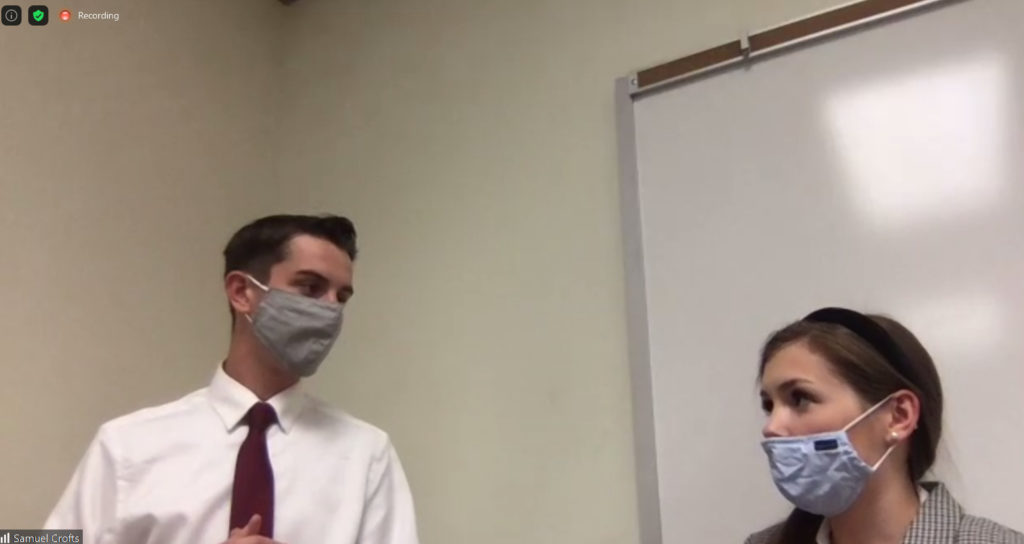
The BYU College Republicans club is helping students form and express their opinions through meaningful discussion as Trump’s presidency divides the political party and club members.
One of the club’s main goals this semester is to expose people to different opinions — even within the Republican party — and encourage diversity of thought, club president Sam Crofts said.
VP of Communications Spencer May said Republicans need to have civil discussions with people they do not agree with for the party to evolve. “It’s very important to allow other people to say what they feel.”
One cause of disagreement within the party is President Donald Trump, with Republican officials and voters being open in their opposition. Similarly, not everyone in the club is voting for Trump.
Quincy Azimi-Tabrizi, VP of Outreach & Events, said she will be voting for Libertarian candidate Jo Jorgensen. “It’s kind of a conflict for me,” she said. “On the one hand, I feel like I’m throwing away my vote. On the other hand, I can be comfortable with myself voting for Jo Jorgensen.”
She said she thinks Trump disrespects the position he’s in and detracts from people who are being oppressed in the country.
“I wouldn’t be comfortable if I voted for someone who I didn’t believe in,” Azimi-Tabrizi said. She encouraged people to “be bold in their choice” if they do decide to vote third party.
May said he will be voting for Trump. “In all honesty, the president does leave you wanting more on the moral end. It’s hard sometimes to separate the individual from the office they hold. We are not in a Book of Mormon situation where our leaders are virtuous men,” May said.
“But what I do believe is that the agenda that’s being pushed by the Republican party is more beneficial and less destructive, less divisive, than what is being pushed by the Democratic Party,” May said. He added that he feels good about what his vote entails in this current election and situation.

One way the club encourages meaningful discussion is through debates.
“People love debates,” Crofts said, adding that they are a great way for people to get involved and explore both sides of different issues.
The first intraclub debate of the semester was held on Sept. 23. Club members argued their positions on Trump’s presidency and COVID-19 mandates over Zoom. This event revealed just how much convictions can clash among people with similar political beliefs.
Luke Kempe, a freshman from Bountiful, Utah studying pre-business, argued that another nominee would’ve done a better job than Donald Trump. Robinson Bracken, a junior majoring in political science from Redlands, California, defended Trump’s presidency.

Kempe said Trump’s awful performance with minorities puts the future of the Republican Party in jeopardy. He suggested Republicans “ditch Trump and find new leaders” to restore the GOP.
A recent example of Trump’s controversial behavior was his Tweet during the nationwide protests over George Floyd’s death in May. He used the phrase, “when the looting starts, the shooting starts.” Twitter flagged it for violating its rules about glorifying violence.
Bracken argued Trump did better with minorities than former presidential candidate Mitt Romney did in 2012. “Donald Trump has fundamentally expanded the identity of the Republican Party.”
Club members also debated COVID-19 mandates. Josh Christensen, a sophomore from Pleasant View, Utah, argued that the government has not overstepped its bounds in limiting the spread of COVID-19.
Faith Hoggan, a freshman from Texas majoring in political science, argued that the government has gone too far through “tyrannical shutdowns of businesses and schools.”
This disagreement is reflected in protests around the country. At a Utah County Commission meeting in July, parents protested their children wearing masks in school.

At the conclusion of the debate, moderator Scott Williams said, “I want there to be at least one major takeaway here: that this group, the College Republicans, is full of diversely thinking intellectuals — people who are capable of articulating thoughts that need to be articulated.” He compared club members to “up-and-coming Ben Shapiros.”
The club will have a debate with the BYU College Democrats on Oct. 27 and is planning on having another intraclub debate right before Thanksgiving. Club members will post updates on Instagram.

The BYU College Republicans club is not endorsing any specific candidate, May said. However, it will be serving as an “intermediary” to help students get involved in campaigns and programs they might be interested in.
Another plan for the semester is a voter registration initiative. Advertising chair Parker Stohlton said the club is partnering with the College Democrats to encourage BYU students to vote.
Stohlton said, “We want as many people as possible to register and vote, regardless of who they vote for. Voting is a right and a privilege that we don’t take for granted and we trust the democratic process.”




